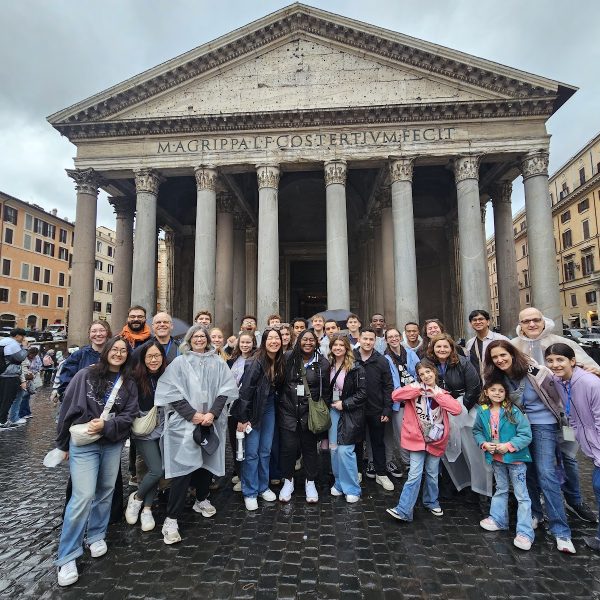More than 20 Vanderbilt engineering students recently visited Italy during their spring break to not only see some iconic structures, but also learn the engineering behind the Pantheon and Venice's sophisticated floodgates so they could apply that knowledge to future engineering projects of their own.

The trip was part of an inaugural class taught this semester in the Department of Civil and Environmental Engineering. It sought to give the 22 students a deeper understanding of the engineering behind some of Italy's structures, such as the ancient Pantheon and MOSE project designed to protect the city of Venice from flooding. The MOSE project is an integrated system consisting of rows of mobile gates that uses air pressure to keep water levels in check.
As part of their class assignments, the students worked in groups to design floodgates as well as build and test concrete dome prototypes based on their studies of how the Pantheon was constructed. The class was originally scheduled for 15 students, but instructors increased the number because of interest.
"We wanted to help students understand the history and the beauty of structural engineering with the hope that they will be able to better work with architects to achieve beautiful and structurally sound buildings in their careers," said Lori Troxel, professor of the practice of civil and environmental engineering and a class instructor.
Read the full story here
Recent excursions to Italy and Israel led by Troxel exemplify a commitment to incorporate experiential learning into the Vanderbilt student experience.
Some students on both trips led by Troxel used the spring break travel to take part in an experiential learning opportunity through an academic degree requirement called Immersion Vanderbilt.
Immersion Vanderbilt was created to provide new ways for students to develop better critical thinking skills and a stronger ability to navigate a changing world. The program steered students toward the travel opportunity while allowing Troxel to teach outside of traditional classroom walls.
"Immersion Vanderbilt encourages faculty to take students out into the world to see firsthand the impact of engineering design. It is a reminder that Vanderbilt values experiences outside the classroom," Troxel said.
"Immersion Vanderbilt helps reinforce the idea that experiential education adds a significant benefit to the theory and design learned in the classroom," she added.
For example, students who traveled to Italy with Troxel gained first-hand knowledge that will help them in future careers. Several students on the trip aspire to be civil engineers, and they are going to be designing protections for cities that must adapt to climate change. Some students incorporated their time in Italy into their senior design projects.
Seeing the MOSE flood protection in Venice helped students understand not only the importance of protecting cities, but how difficult it is, Troxel said. She noted that students who traveled to Israel saw how a country with very few water resources was able to become rich in water through desalination and water reuse.
"Immersive experiences help students realize they can use their creativity and engineering skills to provide a better life for people around the world," Troxel said.






